When I was old enough to choose my junior high school, there were not many international schools. At that time, the international department of public schools and private schools were the more popular options. My family, like most, was inevitably caught in the confusion of choosing a school for almost a year. Looking back now, for a teenager who is not very self-disciplined, I greatly miss and appreciate the three years I spent in the private school. Now comes the school selection time for families again, and the post-epidemic era has triggered a re-examination of international schools by the public. Jingkids International School Expo (JISE) on Apr 17 will offer a chance for private meetings with a large number of international schools at once. But before making a choice, what we need to do is understand is how to avoid the worries that can accompany school choice by considering the following questions.
What Are the Criteria for Judging a Good School and a Good Teacher?
It takes time to truly see whether a student’s full potential has been reached, and sometimes quarterly or progress reports just don’t cut it. If some anxious parents don’t see their child’s potential translate into quantitative grades, they sometimes view it as a failure on the part of the school.
In fact, many international school teachers are very diligent and take their work extremely seriously, even going above and beyond the minimum requirement. If students get low scores, they need to check and reflect on why they got this on their own, and communicate any struggles with classmates and teachers.
From a traditional educational point of view, a teacher who gives his students autonomy is not a responsible teacher. Yet the purpose of international education is to cultivate the ability of children to discover and solve problems on their own while using what they learn in everyday life. The influence of a teacher goes beyond anything a letter grade can show us.
Will You Find a School That Is Just Right for Your Child?
The fact is that now most parents recognize there is not a single school that’s absolutely perfect. But is there a school that is just right for children? I once questioned the decision that my family made to choose a private school instead of a militarized public school, but when this idea came up, I would continue to ask, is the university I chose appropriate? Is the major the best fit for me? Then I realized that having the right balance was the key.
The idea of “just right” may be as unanswerable a phenomenon as Schrodinger’s Cat. On the whole, choosing a school is the same as choosing a job and choosing a partner. Once the general direction is confirmed, the rest requires self-adjustment and continuous check-ins. After all, the school is not the only decisive factor that affects children; their family environment and parents’ perspective are essential to a child’s development as well.
There’s no type of education that can promise success in every period in the future. In my opinion, during each period of a child’s life, the family should make the corresponding choices that make sense for a child. Getting into the next stage prematurely often causes unnecessary anxiety.
Post-epidemic Era: Escape the School Choice Involution
Over the past year, people from all walks of life have discovered their daily lives can be accurately described by the same once-arcane academic term: involution. As Zhou Minxi explained in China Global Television Network (CGTN.com) in December of 2020:
Involution as a social concept was introduced by anthropologists to describe a process of inward overelaboration in agricultural development, where population growth did not result in growth in productivity or a more advanced economic model. Without significant breakthroughs, society spirals into a state of internal friction, with increased complexity but not expansion.
Today, the word is used broadly to convey a general feeling of defeat, when the purpose of competition is to eliminate in a zero-sum game.
Now comes the involution of choosing schools.
In 2020, both the growth rate of the school numbers and the market size decreased. Twelve schools postponed the opening time, most of which are due to the epidemic. “The most fashionable word now is involution, and education is regarded as an area with serious involution. The only way to deal with it is openness, and openness will also bring about diversification of education,” said Li Meng, assistant principal of the World Youth International School.
“The tuition fees of international schools will continue to rise, but as more Chinese return from overseas studies, Chinese parents will have a deeper understanding of what international education is, and they will propose higher standards for international schools requirements. I think this is a good phenomenon because it will ensure that international schools continue to deliver high-quality education to both Chinese families and expat families in Beijing,” said Lodahl, a Danish mother living in Beijing with two girls.
Does this bring up more questions than answers about international education? Good! JISE is the perfect place to meet all of the city’s top international schools and get all your questions answered in one afternoon. It’s a free event this Saturday at Kuntai Jiarui Culture Center. Scan the QR code below for more details.

KEEP READING: Honest Questions to Ask Yourself Before Choosing a School for Your Child
Photo: Jingkids, Pexels




